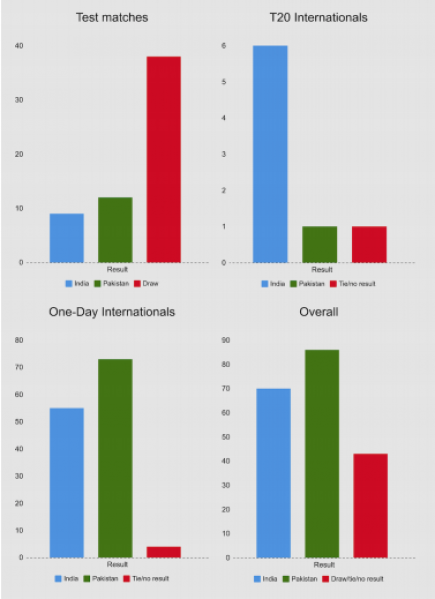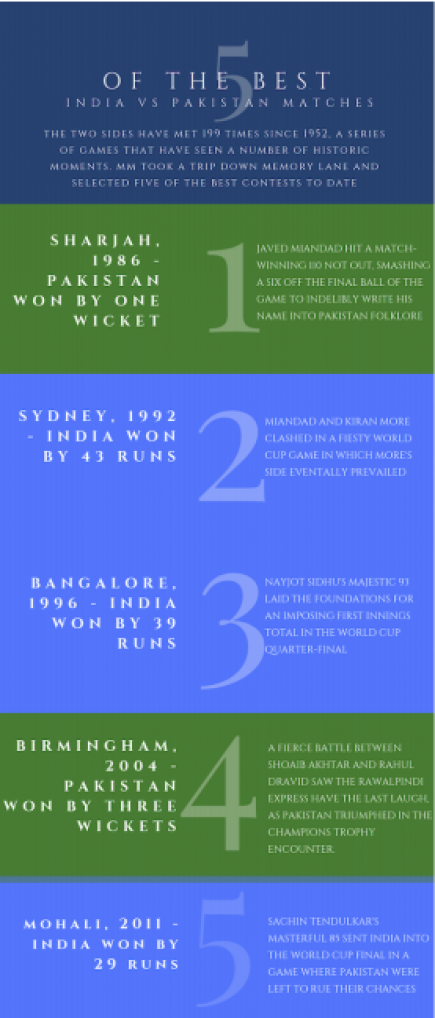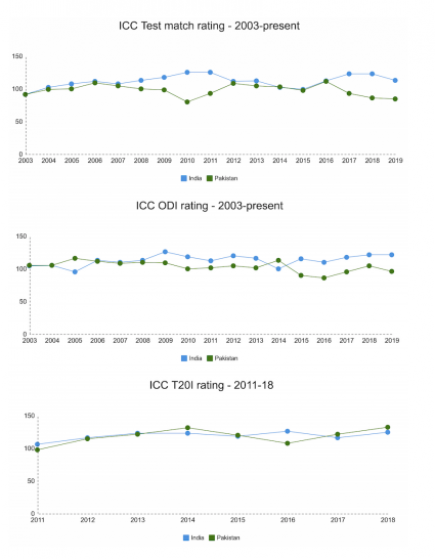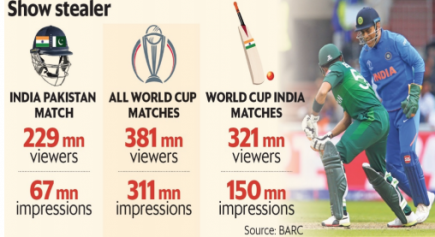There are many who view politics and sport as fundamentally distinct, notions that should only be considered in isolation and when mixed can become volatile or dangerous points of discussion.
Such a judgement, however, is deeply flawed. Politics and sport in fact represent the antithesis to this school of thought, mediums that continually and mutually influence one another in a constantly-evolving narrative.
And in no sporting rivalry is this more visible than between India and Pakistan, two nations driven by an underlying resentment towards each other kick-started by the political turbulence of the mid-20th century.

Indeed, it was the partition of British India in 1947 that turbo-charged such divisions, initiating a period of sustained conflict in the Indo-Pakistani Wars that continues to manifest itself today.
Even the most cursory glance at a BBC News 6 o’clock bulletin over the past few months would reveal the ongoing nature of the conflict, with recent clashes over the disputed region of Kashmir intensifying pre-existing hostilities.
And this rivalry has similarly been played out on cricket fields all of the world since 1952. It was Pakistan’s inaugural tour of India that represented the first of the two sides’ 199 meetings, a duel that has seen the Pakistanis triumph over their old nemesis in 86 matches compared to India’s 70.

With the two teams competing most recently in the Cricket World Cup at Old Trafford in front of an estimated global audience of one billion spectators, MM took a look back at five of the most hotly-contested and memorable games between the two vehement enemies.
1. Austral-Asia Cup, final, Sharjah (1986) – Pakistan won by one wicket
A game remembered for Javed Miandad’s heroics at the eleventh hour to seal a remarkable victory for Pakistan.
The mercurial Miandad – who was already on 110 not out – needed four off the last ball to win it for his country, a feat he duly exceeded by brutally dispatching Chetan Sharma for six.
With only one wicket left in hand, Miandad’s exploits were rendered even more spectacular, capping off an innings of idiosyncratic genius by a man who scored over 30 international hundreds.
2. World Cup, group stage, Sydney (1992) – India won by 43 runs
An encounter remembered not so much for its cricketing drama as it was for its on-field controversy and heated altercation between that man Miandad and Indian wicket-keeper Kiran More.
After More animatedly claimed a catch, Miandad mocked his visible excitement while at the crease, a move that prompted anger from the belligerent Indian.
It was ultimately More who had the last laugh, though, as he contributed two catches, a stumping and the pivotal run-out of Imran Khan to help his side advance in the tournament’s group stages.

3. World Cup, quarter-final, Bangalore (1996) – India won by 39 runs
In a game of high-stakes in front of a raucous home crowd, it was Mohammad Azharuddin’s side who conquered their old rivals, with Navjot Sidhu’s flamboyant 93 laying the foundations for an unassailable 278/8.
Despite Pakistan seemingly cruising at 113-1, stand-in captain Aamer Sohail losing his cool towards Venkatesh Prasad functioned as the turning point, angrily gesticulating towards the seamer who responded by dismissing Sohail with his very next ball. India were jubilant and duly progressed to the semi-finals.
4. Champions Trophy, group stage, Birmingham (2004) – Pakistan won by three wickets
Another fierce contest remembered more for its personally-stimulated fireworks than its cricketing-related events.
An intense battle between Shoaib Akhtar – the Rawalpindi Express – and Rahul Dravid – The Wall – made for a compelling first innings, in which Dravid’s defiant 67 saw India post a total of 200.
His efforts were in vain, however, as Mohammad Yousuf’s 81 not out pushed Pakistan over the line in the game’s final over to restore bragging rights for Inzamam-ulHaq’s side.
5. World Cup, semi-final, Mohali (2011) – India won by 29 runs
Pakistan were made to rue their ineptitude in the field as Sachin Tendulkar’s masterful 85 – he was dropped multiple times – set up a historic Indian victory on home soil and move into a final they would go on to win.
Tendulkar was ably supported by the unorthodox yet majestic Virender Sehwag at the top of the order, with India’s 260-9 proving an insurmountable target for Shahid Afridi’s underdogs to chase.
The tournament marked a memorable one for Indian cricket fans, defeating the old enemy in the last four before clinching the trophy in Mumbai in Tendulkar’s final ever World Cup.

To choose just five games to represent the near-200 contested would be to overly-simplify such a rivalry, however.
Indeed, this is a duel that has continually ebbed and flowed over the decades, spurred on by political developments and seesawing from side to side like the crowds that flock to watch them do as they celebrate each boundary or wicket.
Part of what makes this rivalry so special is the sheer passion shared by both sets of fans, partisan cricket enthusiasts who view the sport as a principal means of determining broader national success.
Some people say sport cannot mix with politics. Clearly, those people remain oblivious to its centrality in the turbulent histories of these two fascinating nations.




